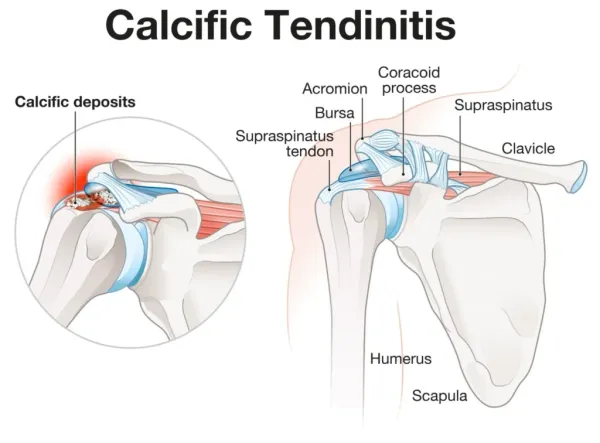The Impact of Anxiety on Pain and Recovery in MSK Injuries
Musculoskeletal injuries make up anything up to 20% of GP consults, and FCP's are there to take this pressure off GP's. Growing research shows that anxiety can play a significant role in the perception of pain and the recovery from MSK injuries

Musculoskeletal (MSK) injuries make up anything up to 20% of GP consults, and FCP's are there to take this pressure off GP's. Recovery from these injuries depends on multiple factors, including the type of injury, the treatment plan, and the patient themselves. However, growing research shows that psychological factors—especially anxiety—can play a significant role in the perception of pain and the recovery from MSK injuries.
This blog post will explore the complex interplay between anxiety, pain perception, and recovery in MSK injuries, so strap in and see what you can do to influence recovery through your 'softer' skills!
The Link Between Anxiety and Pain Perception
Pain is complex, with both physical and psychological elements both playing a factor. Think of it like this (in the simplest form), there is an injury that causes damage, therefore the nervous system responds to stop us causing further harm. However, these are just signals and have to be interpreted by the brain and central nervous system. This is pain. If it's an interpretation, then there can be many different interpretations of those signals. Think about if we all looked at a picture of a puppy.

Some of us like dogs and would react positively. Some of us don't and would react negatively. Pain is like this (again in its simplest form). Therefore, lots of factors can determine our perception of pain. The one we are going to look at today is anxiety.
A study published in The Journal of Pain highlights the connection between anxiety and heightened pain perception. Anxiety can exacerbate pain via several mechanisms, such as increased muscle tension, hypervigilance to bodily sensations, and alterations in pain processing pathways. Patients with higher anxiety levels tend to report more intense pain even when the severity of their injury is similar to those with lower anxiety levels. We also know that quite often pain can last longer in these patients due to the heightened response and a worry that something else 'damaging' or 'serious' is going on due to the psychological aspects associated with anxiety.
The physiological underpinning of why patients with anxiety report more pain is complex but can be understood through the biopsychosocial model of pain. Anxiety activates the body’s stress response, releasing cortisol and adrenaline, which may enhance nociception (pain signalling) and decrease the body’s pain tolerance. Chronic anxiety has also been shown to lead to changes in the central nervous system, promoting a state of central sensitisation, amplifying the perception of pain.
Anxiety and MSK Injury Recovery

As we all know the recovery from any MSK condition can often be time and allowing the body's natural healing process to occur but often rehab in the form of exercise is needed.
One key study published in the Journal of Orthopaedic & Sports Physical Therapy revealed that patients with higher anxiety levels experienced slower recovery following ACL reconstruction surgeries compared to less anxious patients. The study showed that anxiety can contribute to delayed functional outcomes, such as lower mobility scores, increased pain, and reduced strength, even when controlling for injury severity.
This suggests that the psychological state of a patient should be assessed and treated as part of a comprehensive MSK assessment, rather than solely focusing on the physical aspects of the injury.
As we can see, anxiety can negatively influence the rehab process, slowing recovery and, in some cases, this can lead to chronic pain conditions. Let's explore some of the factors as to why this can be the case:
Impact on Rehabilitation Adherence
Anxiety can decrease a patient's adherence to rehab exercises. Studies show that patients with MSK injuries who experience anxiety are more likely to avoid physio due to fear of pain or re-injury. This fear-avoidance behaviour clearly isn't ideal when we want the patient to move! This is often the case with the vast majority of management for common MSK conditions (low back pain springs to mind here!).
Sleep
Anxiety can also impact sleep quality, another critical factor in recovery both from a healing process point of view but also general wellbeing - we all feel better after a good night's sleep! Think also about how many conditions affect sleep quality anyway so with this further reduced it's certainly not ideal!

The Role of Anxiety in Chronic Pain Development
For some individuals, anxiety associated with an acute MSK injury can evolve into a chronic pain condition. Chronic pain is defined as pain lasting beyond the expected healing period of an injury, often beyond 3 to 6 months. Several studies indicate that anxiety is a strong predictor of chronic pain following MSK injuries.
A systematic review published in Pain Medicine found that individuals with pre-existing anxiety or who developed anxiety during the recovery period were at higher risk of transitioning from acute to chronic pain . This relationship is thought to be through maladaptive coping strategies (e.g., catastrophising), decreased self-efficacy in managing pain, and sustained activation of the stress response.
Addressing Anxiety in MSK
Given the significant impact anxiety has on pain perception and recovery, it is critical to address both physical and psychological factors in MSK injury management. Yeh, all well and good but how can we do it you ask?
Simple, ask! Ask about how they are feeling and validate these feelings. Often pain is simply a number we jot down as part of a VAS. Ask (and listen!!) about the impact it is having on their life. Look into their past medical history, when was their last review of their anxiety (if applicable)? Ask them how they are doing generally and if there is anything else they need help with. Simple things but effective. As FCPs in primary care, we are not skilled mental health practitioners, but you don't need to be to ask someone how they are doing.
Then be aware of your referral pathways - some PCNs/surgeries will have a designed mental health practitioner in place to see patients who are struggling, but in others this may not be the case and can be achieved by referring to social prescribers for community groups etc. If you are acutely concerned about a patient's mental health then always discuss with a GP as more intervention may be required
Chronic Pain

So what can help those patients who may be progressing more into chronic pain? These are the sort of things that may be effective and often delivered by community groups, pain management teams and mental health practitioners:
Cognitive Behavioural Therapy (CBT)
CBT has been shown to be effective in reducing anxiety-related pain amplification and improving coping strategies. A randomised controlled trial published in The Clinical Journal of Pain demonstrated that patients undergoing CBT during their rehabilitation process experienced significant reductions in anxiety, decreased pain levels, and improved functional recovery. By reframing negative thoughts and fears about pain and re-injury, CBT helps patients engage more fully in their rehab and therefore the patient gets better outcomes.
Mindfulness and Relaxation Techniques
Mindfulness-based interventions can also help with the effects of anxiety on pain perception. Mindfulness helps reduce hypervigilance to pain and encourages a non-judgmental awareness of bodily sensations. According to a study published in The Journal of Rehabilitation Research and Development, patients practising mindfulness meditation reported lower levels of pain intensity and anxiety compared to those receiving standard care.
Relaxation techniques such as deep breathing and progressive muscle relaxation can further reduce muscle tension and interrupt the feedback loop between anxiety and pain.
Conclusion
As we can see the impact of anxiety on the perception of pain, and therefore the recovery from pain and/or injury is huge. Yes it is not an area of expertise for my FCP's in primary care but as I have shown above, it doesn't need to be! Having an awareness of pain being multifactorial, validating patient concerns and the impact pain is having on them and simply listening are all things we can do and will have an impact. Asking about mental health is often seen as difficult but simply asking someone how they are doing will often open up the conversation and with timely referrals on we as FCPs can have a big impact on both patients presenting with an acute injury and patients presenting with chronic pain.





